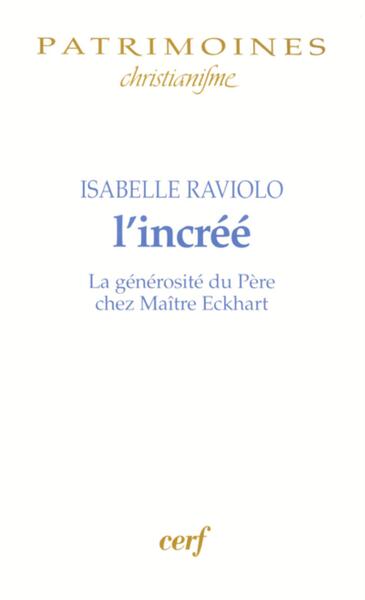- EAN13
- 9782204091473
- Éditeur
- Cerf
- Date de publication
- 20 mai 2011
- Collection
- PATRIMOINE CHRI
- Nombre de pages
- 420
- Dimensions
- 23,7 x 14,6 x 2,4 cm
- Poids
- 588 g
- Langue
- fre
L'Incréé, La Générosité Du Père Chez Maître Eckhart
Isabelle Raviolo
Cerf
Prix public : 44,00 €
Très peu traitée par les commentateurs, la notion d'incréé (" increatus " / " ungeschaffen ") est cependant centrale pour comprendre Dieu et l'homme chez Eckhart. Elle met en lumière le cœur de son œuvre qui se situe dans la naissance de Dieu dans l'âme et non dans le détachement comme on l'a souvent dit. C'est une manière pour le maître rhénan de commenter Genèse 1,26 : " Lorsque Dieu créa toutes les créatures, Dieu n'aurait-il pas auparavant donné naissance à quelque chose d'incréé qui porterait en soi l'image de toutes les créatures ? " interroge Eckhart. Sa réponse tient en une métaphore : l'étincelle (" scintilla animae "). " Cette petite étincelle est si apparentée à Dieu qu'elle est un "un" unique indifférencié et qu'elle porte en soi l'image de toutes les créatures, image sans images et image au-dessus de toutes les images " (" Sermon 22 "). Par " l'étincelle ", Eckhart entend ce que l'âme a de plus semblable à Dieu : un " quelque chose d'incréé ", un fond sans fond (" Abgrunt ") dans lequel le Père engendre son Fils comme dans sa propre nature. Par ce quelque chose d'incréé en elle, l'âme est capable de fécondité et devient mère du Verbe, à l'image du Père incréé qui engendre éternellement son Fils en son sein. La maternité de l'âme trouve son principe dans la paternité de Dieu, dans le bouillonnement originaire de la Vie divine. Eckhart développe ainsi une prédication originale : il parle du point de vue de l'éternité, c'est-à-dire à partir de la Trinité en elle-même. Par la fécondité de l'âme, c'est-à-dire par la grâce de l'Esprit incréé, non seulement l'homme devient fils dans le Fils et le même fils, mais encore père dans le Père et le même père. -- Although rarely addressed in commentaries, the notion of 'uncreated' (increatus / ungeschaffen) is a central one to understand God and man in the work of Eckhart. It sheds light on the heart of his work, which is situated in the birth of God in the soul and not in detachment, as has often been said. It is a way for the German master to comment Genesis 1,26 . "When God created all creatures, wouldn't he have first given birth to something uncreated, that would bear the image of all creatures?' asks Eckhart. His answer is a metaphor: the spark (scintilla animae). "That little spark is so closely related to God that it is a unique, undifferentiated 'one' that carries in itself the image of all creatures, an image without images and an image above all others' (Sermon 22). By "spark', Eckhart means the part of the soul that is most like God: a "thing uncreated', a bottomless abyss (Abgrunt) in which the Father engenders his Son as though within his own nature. Because of that uncreated facet within, the soul is capable of fecundity and becomes mother of the Word, in the image of the Father uncreated who eternally engenders his Son within his breast. The maternity of the soul takes its principle from the God's paternity, in the original effervescence of divine Life. In this way, Eckhart develops an original sermon: he speaks from the point of view of eternity, i.e. from the Trinity itself. Through the fecundity of the soul, in other words the grace of the uncreated Spirit, not only does man become son within the Son and the same son, but father in the Father and the same father.


















